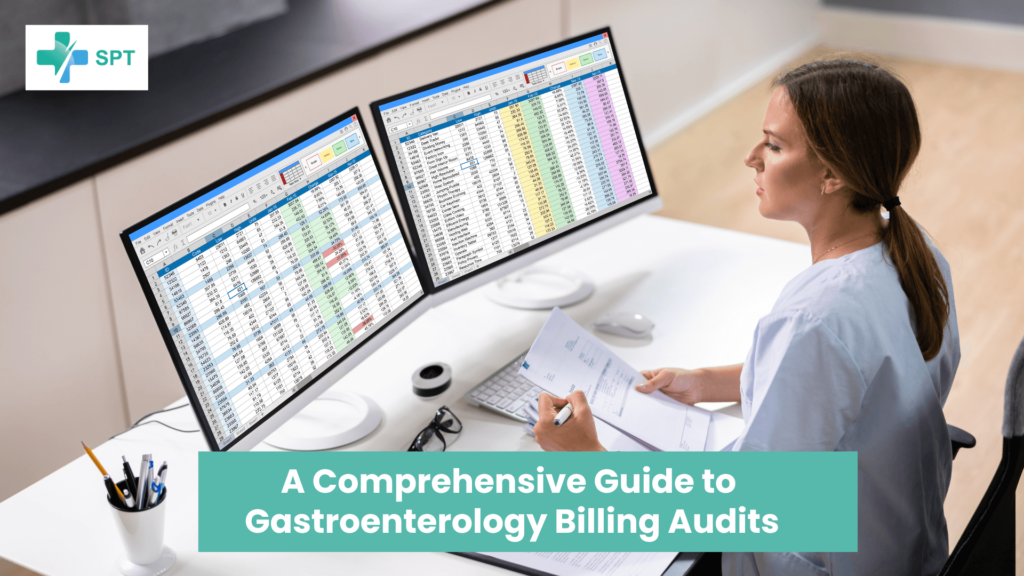Gastroenterology is that branch of medicine in which both the digestive system-related procedures are the most complex and the medical codes also keep evolving. In this ever-changing land, maintaining the correct and up-to-date medical coding becomes the core of the financial safety of the practice of gastroenterology.
This full-fledged guide goes deep into gastroenterology billing audits, setting you up with all the strategies, and knowledge needed to handle them successfully. We will seek, above all, the significance of audits in gastroenterology medical billing, the main constituents of those audits, and the methods for conducting them. Also, we will not pass by the numerous advantages that these audits have to offer to partners, with a handy list of tips provided to smooth the auditing process.
The Importance of Gastroenterology Billing Audits
In the intricate world of healthcare billing, even minor errors can snowball into significant financial repercussions. Gastroenterology billing audits act as a vital safeguard, identifying discrepancies and inconsistencies in your practice’s billing procedures. These audits offer a multitude of advantages:
- Ensuring Accuracy and Compliance: Examine the claims of your practice, whether they are exact, and whether they are consistent with the most recent requirements of the payers and regulatory bodies. Your hard-earned revenues are safe because of the fact that the faults in your claims which have a high potential to be refused or returned will be located during this meticulous examination.
- Identifying Revenue Leakage: It is more probable for gastroenterology practices to lose revenue due to mistakes and corruption in the cycle because they carry the burden of the code-based system. The process of conducting checks serves as a magnum opus that fulfills this task. This is to conduct checks that spot the parts of the system where there might be faults that are not accurately coded but documented properly. By isolating these deficiencies, you can take corrective measures in order to boost the money you get back.
- Promoting Transparency and Trust: Regular audits foster transparency within your practice, ensuring that everyone involved in the billing process adheres to established protocols. This demonstrably ethical approach builds trust with both patients and insurance providers, promoting a positive and sustainable healthcare environment.
Key Components of Gastroenterology Billing Audits
A comprehensive gastroenterology billing audit typically evaluates the following key components:
- Coding Fitness: Accounting Specialists review the codes in your claims very carefully to ensure they reflect the services well. The E/M (Evaluation and Management), procedure, and modifier codes could be incorrect.
- Professional Necessity: External auditors perform a clinical necessity audit and decide on whether a service is required or not. Doctors will verify that the patient’s condition needs the procedures performed, based on medical necessity, and the patient’s history for that condition. However, if these medical services were not really justified, then they will not be reimbursed to you.
- Documentation Quality: Auditors review your medical records. They exclusively check if your medical records are capable of standing grounds for your charges. This includes verifying that the records document the patient’s condition, the reason for the procedure, and the corresponding services very carefully to the process.
- Compliance with Payer Policies: Audits verify that your billing practices comply with the specific policies and requirements of each insurance company you work with. This includes adhering to their coding guidelines, prior authorization requirements, and timely filing deadlines.
Conducting a Gastroenterology Billing Audit
There are two primary ways to conduct a gastroenterology billing audit:
- Internal Audits: Proactive practices can conduct internal audits regularly to proactively identify and address any potential billing issues before they escalate into major problems. This allows you to maintain control over your revenue cycle and minimize the risk of external audits.
- External Audits: External audits are typically initiated by insurance companies or government agencies to verify the accuracy of your billing practices. These audits can be more rigorous and may result in financial penalties if discrepancies are found.
Also Read: How Medical Billing Audit Helps
Benefits of Gastroenterology Billing Audits
While audits may seem daunting, they offer a multitude of benefits for your gastroenterology practice, including:
- Reduced Claim Denials: By identifying and rectifying errors early on, audits significantly decrease the likelihood of claim denials. This translates to faster claim processing and improved cash flow for your practice.
- Increased Reimbursement: Audits can help ensure that you’re coding services appropriately, maximizing your reimbursement potential from insurance companies.
- Improved Operational Efficiency: Audits highlight areas where your billing processes can be streamlined. This allows you to identify and address inefficiencies, leading to a smoother and more efficient revenue cycle.
- Enhanced Staff Training: The medical billing audit process can reveal areas where your staff may require additional training on coding and billing procedures. This translates to a more knowledgeable and up-to-date staff, further minimizing errors and streamlining operations.
Gastroenterology Billing Audit Checklist
To facilitate a smooth and successful gastroenterology billing audit, consider implementing the following checklist:
- Maintain Organized Records: Ensure your medical records are well-organized, complete, and readily accessible for auditors to review.
- Standardize Coding Practices: Establish standardized coding protocols within your practice and ensure your staff receives ongoing training on the latest coding guidelines.
- Perform Internal Pre-Audits: Conduct regular internal pre-audits to proactively identify any errors or inconsistencies in your billing practices before a formal audit occurs. You can designate a staff member or utilize coding software with pre-audit functionality to review a sample of claims for accuracy and compliance.
- Verify Prior Authorizations: Ensure you have obtained all necessary prior authorizations from insurance companies before performing procedures. Missing or incorrect authorizations can lead to claim denials.
- Review Charge Capture Processes: Scrutinize your charge capture processes to guarantee all services rendered are accurately documented and billed. This includes verifying that time spent with patients, procedures performed, and medications administered are all reflected in the billing codes used.
- Confirm Insurance Eligibility: Double-check patient insurance eligibility before their visit to avoid claim denials due to coverage issues.
- Maintain Accurate Modifiers: Ensure proper use of modifiers to accurately depict the complexity or specific circumstances surrounding a procedure. Incorrect modifier usage can result in claim denials or underpayments.
- Document Timely Filing: Maintain a system to track claim submissions and ensure all claims are filed within the designated timeframes set by insurance companies. Missed deadlines can lead to automatic denials.
- Develop a Corrective Action Plan: Establish a clear and documented plan for addressing any discrepancies identified during internal audits or external audits. This plan should outline steps for correcting errors, preventing future occurrences, and communicating with affected parties.
Conclusion
Gastroenterology billing audits, while sometimes perceived as a burden, are an essential tool for safeguarding the financial health of your practice. By proactively conducting internal audits, adhering to best practices, and remaining prepared for external audits, you can ensure accurate and compliant billing, minimize errors, and maximize your reimbursement potential.
Remember, a successful audit outcome fosters a win-win situation for all parties involved. It guarantees accurate payments for your practice, ensures patients receive the care they deserve, and promotes trust and transparency within the healthcare system.





